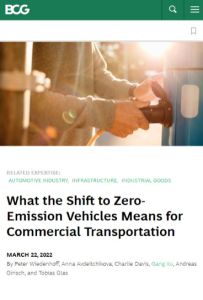Join getAbstract to access the summary!

Join getAbstract to access the summary!
Peter Wiedenhoff, Anna Avdeitchikova, Charlie Davis, Gang Xu, Andreas Girisch and Tobias Glas
What the Shift to Zero-Emission Vehicles Means for Commercial Transportation
Boston Consulting Group, 2022
What's inside?
The conditions are finally right for the green vehicle revolution.
Recommendation
Gottlieb Daimler created the first truck, and given its combustion engine, he dubbed it (appropriately) “the Phoenix.” That was in 1896. Now, the internal combustion engine is out and the green powertrains of the future will rise from the ashes. This report from the Boston Consulting Group describes how vehicle manufacturers can prosper amid growing environmental regulations and economic pressures.
Summary
About the Authors
Peter Wiedenhoff, Anna Avdeitchikova, Charlie Davis, Gang Xu, Andreas Girisch and Tobias Glas are professionals with the Boston Consulting Group.



















Comment on this summary